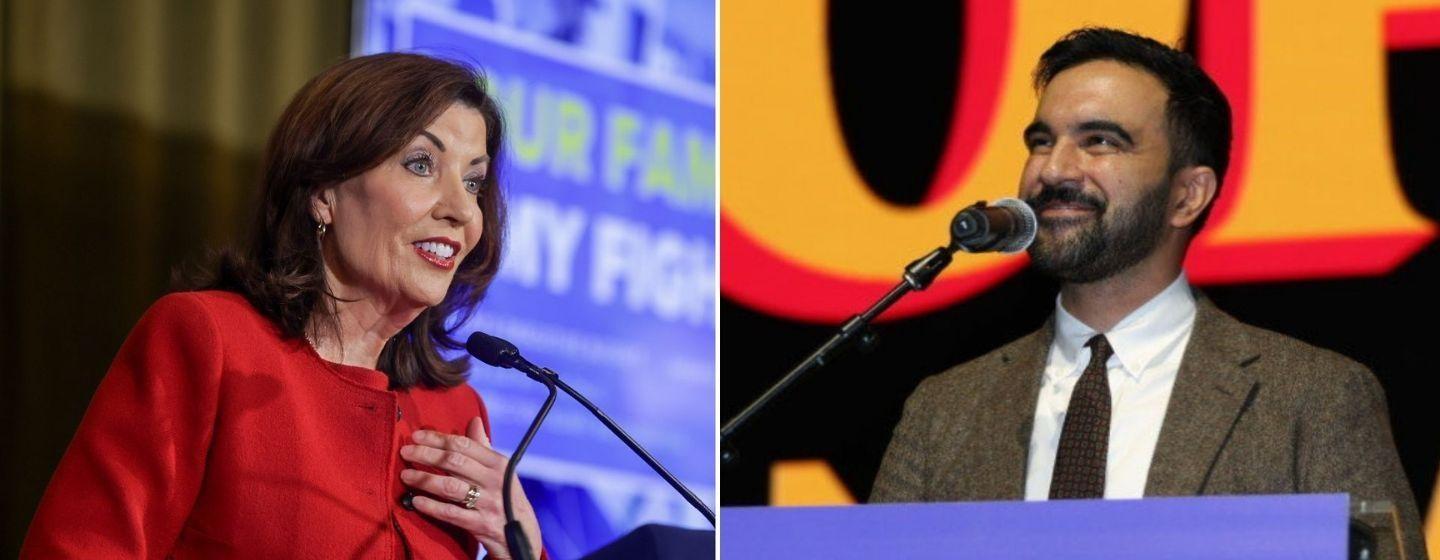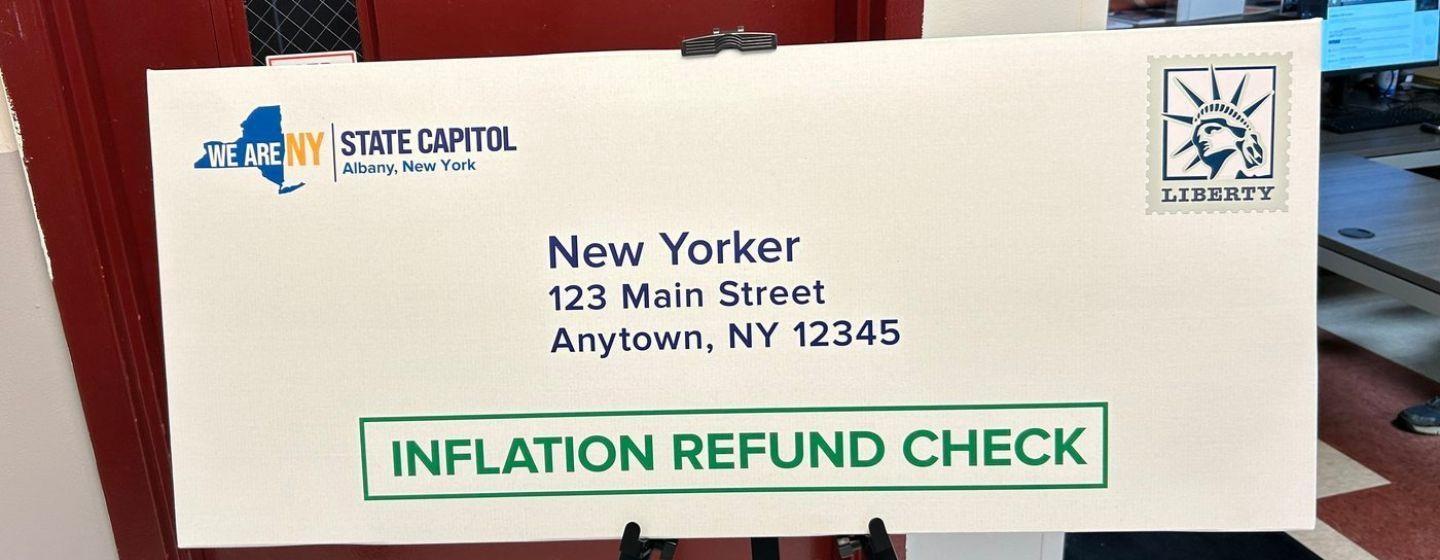Mamdani, Gov. Hochul Agree on Universal Child Care. How To Pay for It? Not So Much

The path to Zohran Mamdani’s pledge of universal child care runs through Albany, where the Democratic nominee for mayor has a major ally in Gov. Kathy Hochul.
While they’re both in lockstep on the goal, they don’t agree on the most important part of making no-cost child care a reality: how to pay for it.
Hochul, a moderate Democrat who endorsed Mamdani’s campaign last month, has pointed to the issue of universal child care across the state and city as one where they see eye to eye. But Mamdani, a state assemblymember, wants to raise taxes on the wealthy and corporations to pay for it, which Hochul has traditionally opposed.
The funding battle highlights the uneasy partnership between the two Democrats as they try to forge a political alliance despite hailing from different generations and different flanks of their party. There are recent signs, though, of potential compromise should Mamdani win in November, with the mayoral candidate signaling he’s more concerned about enacting his policy agenda than implementing his preferred tax.
“If this money is funded by the additional taxes or it's funded by a better-than-expected assessment or it's funded by a pot of money that wasn't previously spoken about, or savings that have come in, then the most important thing is that it's funded,” the mayoral nominee told reporters Monday.
New York residents paid more for child care from 2018 to 2023 than every other state except Massachusetts. The average cost to New Yorkers was $14,621 per child in 2023, according to federal data cited in a report by state Comptroller Thomas DiNapoli’s office.
Since launching his campaign a year ago, Mamdani — a democratic socialist who has centered his platform on affordability — has pledged to provide access to care for each child in New York City aged six weeks to five years at no cost to their parents or guardians.
Hochul, too, has honed in on child-care issues, boosting subsidies for income-eligible New Yorkers and pledging to “put our state on a pathway to universal child care” as part of her State of the State address in January.
In 2021, a state task force laid out a roadmap for enacting universal child care in New York, which focused in part on boosting wages for child care providers in hopes of stabilizing and expanding the workforce. Last year, the same task force recommended the state implement yearlong universal child care pilot programs in urban, rural and suburban areas of the state to test whether they’d be feasible.
Shoshana Hershkowitz, campaign manager for the Empire State Campaign for Child Care, said the first step toward enacting a universal system is to stabilize and expand the workforce — which would require state funding to ensure child care workers get paid a livable wage.
A majority of New Yorkers live in areas of the state where there’s far more demand for child care than there are available spots, she said.
“So compensating the workforce and recruiting and retaining a workforce is going to be one of the things that has to scale up for us to be able to meet the demand,” said Hershkowitz, whose campaign includes a variety of organizations pushing for a child care expansion.
Hershkowitz said the campaign is looking for state leaders to put up $5 billion as an initial downpayment on a universal system, though she said some estimates have suggested it may cost between $12 and $20 billion statewide as the program ramps up.
Mamdani’s critics are skeptical he could make it happen in New York City, particularly as the state faces a nearly $11 billion deficit next fiscal year.
Former Gov. Andrew Cuomo, who is running for mayor on an independent line, has painted many of Mamdani’s proposals as pie-in-the-sky plans designed to court votes, rather than deliver policy.
Cuomo’s pushing a plan to provide universal 3K for city children. He and state lawmakers provided funding for universal Pre-K for 4-year-olds when former Mayor Bill de Blasio took office in 2014.
Curtis Sliwa, the Republican mayoral candidate, has acknowledged the high cost of child care in his plan to revive the city, but most of his affordability platform focuses more on the cost of housing.
Hochul said she discussed the cost issue with Mamdani while she was weighing whether to endorse him. She estimated a universal system would cost $7 billion in New York City alone, and she made clear any system wouldn’t be put in place overnight.
“ I have to double that for the rest of the state,” she said last month. “So we had conversations along the lines of: How do you get to that place someday, but you manage the rollout over time?”
Hochul has not proposed a funding source for her child care push, though she’s successfully blocked any income-tax hikes since taking office in 2021 — despite a push from some Democratic lawmakers, including Mamdani, to increase taxes on the wealthy.
She will propose a state budget for the next fiscal year in January, but as she’s heading into a tough re-election fight in 2026, raising income taxes is likely the last thing Hochul plans to do.
State Sen. Mike Gianaris, a Democrat from Queens who is the second-ranking member of the Senate, pushed back on the idea that there would have to be a long, drawn-out rollout.
“It doesn't help people today if we're on a path that gets us universal childcare 10 or 15 years from now,” said Gianaris, the parent of a young child and a Mamdani supporter. “This is an urgent need that people have. We should be able to find a way to tackle it comprehensively in the short term.”
State Sen. Jake Ashby, an Albany-area Republican, said child care providers face all sorts of different hurdles to providing care in New York – from staffing shortages and high insurance costs to big property tax bills and utility payments.
“These are complex, systemic problems,” he said. “That we're going to wave the magic wand and handle this quickly by government fiat seems like wishful thinking to me.”
Supporters of universal child care say the cost of doing nothing on child care is too great to bear. Providing universal care would shift the burden from parents paying out of their own pockets to “a public investment shared by all New Yorkers,” said Rebecca Bailin, executive director of New Yorkers United for Child Care, an advocacy group.
“We don't question whether third grade should be a free, public service. Why should child care be any different?” she said.
Mamdani, meanwhile, hasn’t given a firm deadline for completing much of his agenda, including his child care proposal. When pressed by reporters, he said he’d complete his goals before leaving office, should he win.
“By the time that I am done being the mayor of this city, this will be a reality for each and every New Yorker,” he said. “We're going to be pushing every single day to deliver it as soon as possible.”
Hochul said she’s already talked about some specifics with Mamdani on child care, but there will be more conversations to come.
“My view was: Let’s get to the election and then we'll talk,” she said last month.
This is a New York Public News Network story originally published on Gothamist.
Related

‘Inflation Refund’ Checks Coming to New Yorkers’ Mailboxes As Soon as Next Week
The check is in the mail for millions of New York state tax filers — or at least it will be soon.


